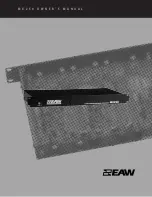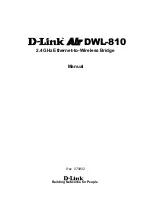
DCB, Inc.
2949 CR 1000 E
Dewey, Illinois
61840
217.897.6600 Tel
800.432.2638 Toll Free
217.897.1331 Fax
www.dcbnet.com
8 DBRA (Data Bridge Card) Startup and Configuration Guide
Ver 2, April, 2011
There are 2 version of the 8DBRA card, one with 2 RJ45s and 2 HD44 connectors that require 2
fanout cables, each with one DE9 and 2 DB25s. The other card has 8 RJ45 connectors. The all
RJ45 version is preferred because the connectors are all the same. The card supports transmit
data, receive data and ground on each port. RS232 control leads are not supported.
The 8DBRA card with the 8 RJ45 connectors provides easier, cleaner looking connections.
Pin outs for the RJ45 connectors:
Pin Number
Signal
Source
1
Signal Ground
Common
3
Received Data
DCE (8DBRA)
5
Transmitted Data
DTE
7
Signal Ground
Common
The 8 DBRA card supports asynchronous ports at any speed up to 19,200 bps. The speed
setting in the 8DBRA card setup screen is for reference only.
The 8DBRA card is compatible with other 8DBRA cards and any synchronous RS232 56Kbps or
64 Kbps card or 56K or 64K OCUDP from Loop or other manufacturers (tested!). The 8DBRA
card uses oversampling. See Page 16 for a description of the oversampling technique. Terminal
devices attached to non-8DBRA cards must run at the same speed as the devices attached to
the 8DBRA cards.
The 8 ports of the 8DBRA can be mapped into 3 or 4 Virtual Ports (VP). If the 8DBRA card is
configured for “NO Backup” or “1+1 Port Backup”, all 4 of the Virtual Ports are available.
Backing up the entire card in the same or a different chassis limits the card to 3 virtual ports.
Data is carried to the backup card, whether in the same chassis or to a remote site, via one of
the Virtual Ports (VP4).
Page 1


































